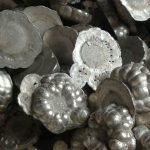Notice: Undefined index: sith_hide_share in /www/sites/alloy.wiki/index/wp-content/themes/likegoogle/single.php on line 32
Deprecated: get_settings is deprecated since version 2.1.0! Use get_option() instead. in /www/sites/alloy.wiki/index/wp-includes/functions.php on line 4862
Medical titanium bars and titanium alloy materials, since the 1980s, the application of biomedical titanium rods and titanium alloy materials has gradually matured, from the original TI-6A1-4V alloy to the current ASTM F1713-1996 and ASTM F1813-1997 in titanium alloy implant materials. However, since the beginning of the new century, the research on the harm of TI-6A1-4V alloy to human body has become more and more thorough, and the two newly developed alloy materials have been applied more and more widely.

Most research reports indicate that TI-6A1-4V alloy can cause osteoporosis and mental disorders, and it is for this reason that more material scientists start to study new titanium alloy materials that do not contain V and A1. ASTM F1713-1996 and ASTM F1813-1997 were developed in such an environment.
Among them, ASTM F1713-1996 is a biological titanium alloy with excellent comprehensive properties, such as low elastic modulus, high strength, high toughness, high fatigue strength and good biocompatibility, developed by American scientists in the 1990s. Compared with TI-6A1-4V, Ti-13NB-13ZR alloy has 30% lower elastic modulus, 20% higher plane fracture toughness and 30%-40% lower bending and shear modulus.
And ASTM F1813-1997 is also developed by many famous gold experts in the world in recent years for biological applications. Compared with ASTM F1713-1996 alloy, ASTM F1813-1997 alloy has lower elastic modulus, strength and fracture toughness, and it is a kind of metastable P-type biomedical alloy with good comprehensive performance.
At present, ASTM F1813-1997 alloy is widely used and mature in the field of medical orthopedics. The world's largest orthopedic company, Stryker Joints, adopts ASTM F1813-1997 alloy to manufacture the femur handle MeridianTMZF in the hip joint prosthesis system, which has reached the highest standard of orthopedic clinical requirements in terms of quality, function and clinical effect.
Of course, in addition to the application of titanium rods in the biomedical field, titanium tubes and titanium plates have been involved in these fields and have been developing well. In the future, the application of titanium and titanium alloy in the medical field will be more mature.
Guest contributors are welcome at the Alloy Wiki.It is a weekly wiki and guide on alloy information and processing technology, while also about the vast array of opportunities that are present in manufacturing. Our team of writers consists of a Machining Material Supplier / Machinist / Tool and Die Maker, a Biomedical Engineer / Product Development Engineer, a Job Development Coordinator / Adjunct Professor, and a President and CEO of a manufacturing facility.
Link to this article:Medical titanium bars and titanium alloy materials
Reprint Statement: If there are no special instructions, all articles on this site are original. Please indicate the source for reprinting:Alloy Wiki,thanks!^^


